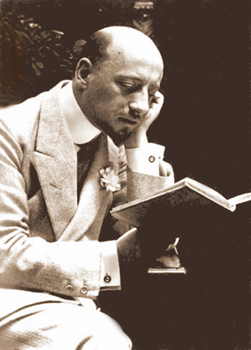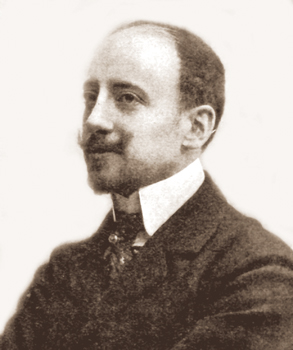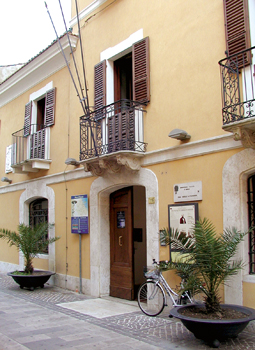Pro memoria
GABRIEL D’ANNUNZIO (1863-1938) WROTE PERHAPS THE MOST BEAUTIFUL POEM ABOUT SERBIA, WHICH HASN’T BEEN CREATED IN SERBIAN
Ode to the Serbian Nation
The great Italian poet, multiple war hero, favorite of beautiful women and high class salons, an unusually striking personality, dedicated Serbia touching verses of admiration, encouragement and support during World War I. “Corriere della sera” from Milan published them as a whole on November 24, 1915. His deep knowledge of Serbian history and understanding the Serbian being is striking. He personally wrote one copy in calligraphic letters and sent it, along with the printed copy, to the Serbian king Petar I. And do you know: does D’Annunzio have a monument or a street in Belgrade?
By: Bela Draganić
 “What is that constant cry tearing the mountain bosom? What is that clamor beyond senses shaking thick forests, suffocating the breath of icy rivers, creating restlessness in springs? Oh, Serbia of Stefan, oh, Kingdom of Lazar!...” “What is that constant cry tearing the mountain bosom? What is that clamor beyond senses shaking thick forests, suffocating the breath of icy rivers, creating restlessness in springs? Oh, Serbia of Stefan, oh, Kingdom of Lazar!...”
These are verses from the beginning of The Ode to the Serbian Nation written by Gabriel D’Annunzio, the poem whose beauty and ambiguity could perhaps only be compared with the beauty of Davičo’s Serbia.
With his verses, one of the most beautiful ones dedicated to the Serbian people, the poet brings back to memory heroes and places of Serbian history: Stefan and Lazar, nine Jug-Bogdan’s sons, the earth of Milica’s crying, proud Hajduk Veljko, Banovo Brdo and Belgrade, Marko’s Serbia, Emperor Dušan, Kosovo Polje, Rudnik, Topola, Djordje Petrović, the Danube, the Vardar, the Timok and the Drina, Šumadija…
In one place, he furiously sings:
“Oh, Marko’s Serbia, where are your maces now? Cannot anyone hear you? Come on, people of Marko, be brave! Have a strong heart, a heart of steel before fate! You are, oh, people: split, divided, cynically into two parts, two bloody corpses, like Hajduk Veljko was hit at the tower…”
This poetic literary work, a summary of Serbian history, was written by the famous Italian during World War I. In autumn 1915, on November 24, Corriere dela serra, magazine from Milan, published the Ode integrally. When weapons are rattling, war reports are more valuable than poetry. However, who could resist these verses, which sing about and eternally preserve the ill-fate of Serbian existence and suffering in the Balkan wonderland.
With calligraphic handwriting, the poet himself wrote his verses and, together with several copies of the book, personally bearing the costs of printing, sent them to king Petar I Karadjordjević, the martyr king who suffered the Albanian Golgotha at his old age. This edition was printed with two kinds of covers; the Serbian coat of arms was in the right upper part of the more luxurious one.
FROM A HERO TO HEROES
 The eccentric Italian with spirit and gift, himself a knight in his heart, admired the old king who went through the Balkan crags with his people. The eccentric Italian with spirit and gift, himself a knight in his heart, admired the old king who went through the Balkan crags with his people.
The verses are a bow to the Serbian nation and its sufferings. D’Annunzio sings:
“Smederevo has been seized, the city is standing, they have also seized the white city, Belgrade, the capital, in fiery hell: from Lipar to the great Vračar, each hill became a boiling furnace…They have filled the Mountain with blinded old ones, they cut women’s breasts, and crippled children crawl to lick flour. The killers also turned Sopot into their pathetic butcheries…”
On behalf of the government, minister Ristić thanked the poet also on these verses with a deep meaning and fullness:
“Oh, Serbia, cry on your knees. Then get up and jump, return into your hands the church, the fortress, the sanctities of the altar and the main tower, the empire and fate…”
And on these sinister verses:
“Lazar lost his head on flat Kosovo, the empire fell, the glory was extinguished. The black Bulgarian coming from Skopje shakes off the mud on flat Kosovo, paying respect to the shameful victory. Hold on, Serb! Hear the furious cry of Hajduk-Veljko who is resurrected and renewing his strength. Hold on, be courageous!...”
Who would recognize the work of a poet better than another poet would? Milutin Bojić immediately translated the Ode with the help of a Serbian soldier, with notes accompanying it written by Nicola Thomase, another Italian poet. The Ode was printed as a whole, the notes were reduced, and the verses interleaved with blanks: empty places. The diligent war censors left out parts speaking against the Austrian and German emperors. Especially the one where the poet sings:
“The Habsburg executor, the old killer of the weak and frail, the cutthroat of feeble children and women, the unchaste old man through whose nostrils loads of worms swarm, and the stinky soul, bleary and slobbery, spills from his eyelashes and beard, the stumbling and agonizing fugitive, pierced with your sword on Cer, in Valjevo, in Guča…”
THE WORST AVOIDED: MEDIOCRITY AND BOREDOM
 Almost a century has passed since The Ode to the Serbian Nation was written. In the meantime, it often seems that the writer has been forgotten, both here and in his homeland. Hence this humble attempt to preserve the name of Gabriel D’Annunzio from oblivion, to shed light on the work and life of an unusual man and artist, laurelled with glory and honor at his time. Almost a century has passed since The Ode to the Serbian Nation was written. In the meantime, it often seems that the writer has been forgotten, both here and in his homeland. Hence this humble attempt to preserve the name of Gabriel D’Annunzio from oblivion, to shed light on the work and life of an unusual man and artist, laurelled with glory and honor at his time.
Various epithets accompany the name of Gabriel D’Annunzio. He was called various names: the decadent artist, aesthete, sorcerer, genius, war hero and politician, women lover, bold aeronautic pioneer…
A hopeless romantic, he did everything to avoid “the worst: mediocrity and boredom”. He subjected a carefree life to adventure. And what an adventure!
Just grown out of short pants, a young man with a literary gift published his book of poetry The First Verse. Soon afterwards, he wrote the book The New Poem. However, only with the book of short stories The Virgin Land, he entered the world of literature through a great door, but also entered the world of high class. He was intoxicated with scandalizing the provincial hypocrisy and stormy polemics. Intrigues are also his hobby. Boccaccio, Wilde and Prust couldn’t resist it before him, then why would he? “If you speak to someone into his ear, he will be more ready to believe you”, he used to say.
He attended the best schools. He studied literature and philosophy in Rome.
Although he entered literature as a poet, his novels later brought him fame. He was highly ranked among poets. He brought the breath of European decadence, the aesthetics and charm of the irrational into Italian poetry. He was cautious with words. The verses express sensuality and a new rhythm.
Unusually musically gifted, he used to say that the Italian language is melodic, that it can compete with a large Wagner orchestra and implement into our souls what only music can. “Poetry is music too”, says D’Annunzio. He will do everything to realize this, at least in his case.
THE PRINCIPLES OF ROMANTIC PATRIOTISM
.jpg) The literature student enjoys his glory as a poet and the glamour of the Rome aristocracy, where his temperament and particularity fit in well, more than he enjoys classes. At the age of twenty, he married a duchess, Maria Arouine. The bride would soon experience that his impetuous nature and tumultuousness are no guarantee for a happy marriage. The literature student enjoys his glory as a poet and the glamour of the Rome aristocracy, where his temperament and particularity fit in well, more than he enjoys classes. At the age of twenty, he married a duchess, Maria Arouine. The bride would soon experience that his impetuous nature and tumultuousness are no guarantee for a happy marriage.
About fifteen years later, at the threshold of real maturity, Gabriel D’Annunzio met the woman of his life, the famous actress Eleonora Duse. Strong feelings initiate creativity. With the great artist and temptress, he reached his mature phase, laurelled with fruitful creativeness.
The poet’s love and creative workshop then moved to villa “Coponchina” in Settignano. He lived a life of luxury, his second nature.
The seductive diva Eleonora Duse fits well with the reputation of a renaissance gentleman. She inspired many of his verses and initiated dramas. Then came a series of them: Giaconda, Gloria, Francesca de Rimini, Jorio’s Daughter, The Ship, Fedra… Inspired by his love for the famous actress, he wrote his first three books of Eulogies, considered the crown of his poetry.
However, the carefree life has its price. Sunk into debts, the poet ran away from Italy to France. There he wrote several dramas in French. Claude Debussy composed music for his drama The Martyrdom of Saint Sebastian (1911).
The war trumpets are heard all the way to France. The poet-patriot went back to Italy in 1915, to fight in the war against Austria. His courage was admirable. He is a poet and a knight, an experienced warrior.
He went through almost all services of the army: infantry, navy, aviation. One of his most remarkable accomplishments was the flight over Pula in 1917, and then a year later the legendary venture called “the Bakar mockery”, when several Austrian ships anchorof in the Istra bases were sunk. However, the fearless thousand kilometers long flight over Vienna brought him the greatest glory.
It could have easily happened that the glory of the soldier covered up the glory of the poet. He ended the war as a winner, with one gold medal for courage, five silver ones, one bronze, and many other medals.
THE UNFORGETTABLE CONQUERING OF RIJEKA
The war was over, but not for the poet.
D’Annunzio began his own battle. He was the head of “Ardita”, a group of volunteers with whom he fought to separate Rijeka from Yugoslavia and grant it to Italy. And, behold, Rijeka was conquered easily, without any problems, but Italy rejected the generous offer of its poet. It doesn’t want his maniacal Rijeka republic.
Modern turncoats, lead by the fearless and lunatic poet, managed to attract several Italian merchant ships which give the republic a future: money in cash deposits. The word spread. Adventurers, artists, bohemians, refugees, fugitives started coming to Rijeka in crowds…
Intoxicated with the pandemonium, the poet spent sleepless nights with songs and music. Fun never stops. D’Annunzio reads poetry and proclamations from the balcony every morning, there is a concert every evening, and then fireworks.
This lasted for eighteen months. When wine and money were gone and the music died, the Italian fleet finally came. Several projectiles were fired at the city assembly, but no one had to strength to fight any more.
That was the end of the maniacal Rijeka republic (which Italy did annex later).
In 1922, the poet withdrew into the loneliness of the “Cargnaco” villa at the Gardone Riviera at Lake Garda, which he illuminated and turned into a sanctuary of poetry, art and heroism with his lucid nature. Two years later, he was given the title Prince of Montenevoso.
The unusual Italian also experienced the rise of Mussolini. At the beginning, he supported him. He wasn’t able to avoid the banality with which authority seduces and treads down an ingenious man. However, he resisted the powerful leader. He stroke back. He fought him with his strongest weapon, his pen. In his letters, he addresses the Duce and the regime with sarcastic words and curses. Mussolini, concealed, doesn’t act in an open manner to calm the poet’s anger. He envies the poet, hero, lover, man of great culture. He tries to quiet down the poet with generosity, or at least to mitigate his stings. The fascists are also suspicious. Before the march on Rome, they blocked the poet-prophet in his villa.
D’Annunzio openly hates Hitler. He calls him Attila, and warns Duce: “Watch out, word is out that you are close to the German!” He doesn’t hide his rage because of the pact between Italy and Germany.
He didn’t live to see Hitler’s campaign to conquer the world. He died on March 1, 1938. According to some sources, he died of a stroke, and according to others it was “a fall from the balcony in the presence of authorities”. In any case, D’Annunzio was old, insensitive to what was happening around him.
The way the poet left this world is perhaps not the most important thing for the history of literature. More important is his literary will. After D’Annunzio’s death, his collected works were published only in 1950. About twenty years later, his correspondence with Mussolini was printed. Today, D’Annunzio is almost forgotten in Italy, and his theatrical plays are rarely performed.
His novel The Innocent (translated by Mirjana Djukić Vlahović and Tamara Vlahović) was recently published here, where D’Annunzio announces what will happen to the world in the following centuries: the reflux of all kinds of love and amorality. Oh, how fast the future came!
To those who doubt the great talent of the forgotten poet, we dedicate the words of James Joyce: “I think that in the XX century, nature gifted three writers with the greatest talent: D’Annunzio, Kipling and Tolstoy.”
***
Translations
The unsigned translation of The Ode to the Serbian Nation was published on Corfu in 1916, in the Serbian Newspaper. Four years later, Bojić’s younger brother Radivoje revealed that the famous Serbian poet Milutin Bojić translated it.
There were more attempts to translate the verses of this friend of the Serbian people. It is known that a group of Austrian prisoners, originating from Serbia, translated the poem in the war camp in Liguria (Castello di Gava), with an accompanying letter of gratitude to its author. The translation was never found.
Those were the “early works” of translating. Today, one can easily read The Ode to the Serbian Nation and enjoy it, thanks to the extraordinary translation of Dragan Mraović.
***
Born for Great Deeds
When she gave birth to him in Pescara on March 12, 1863, his mother seems to have seen through the life of her precious child. She cried: “My son, you were born in March, on Friday. Who knows what great things you will do in this world!”
Since the earliest days, the poet had all the later gifts and characteristics. Both the good and the bad ones. With them, the dreamer traveled through his life and lived for 75 years. And managed to “avoid the worst”: mediocrity and boredom.
|
